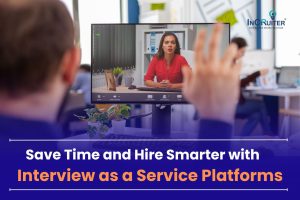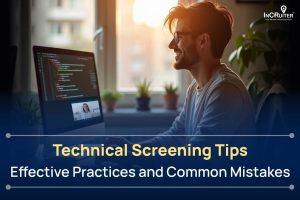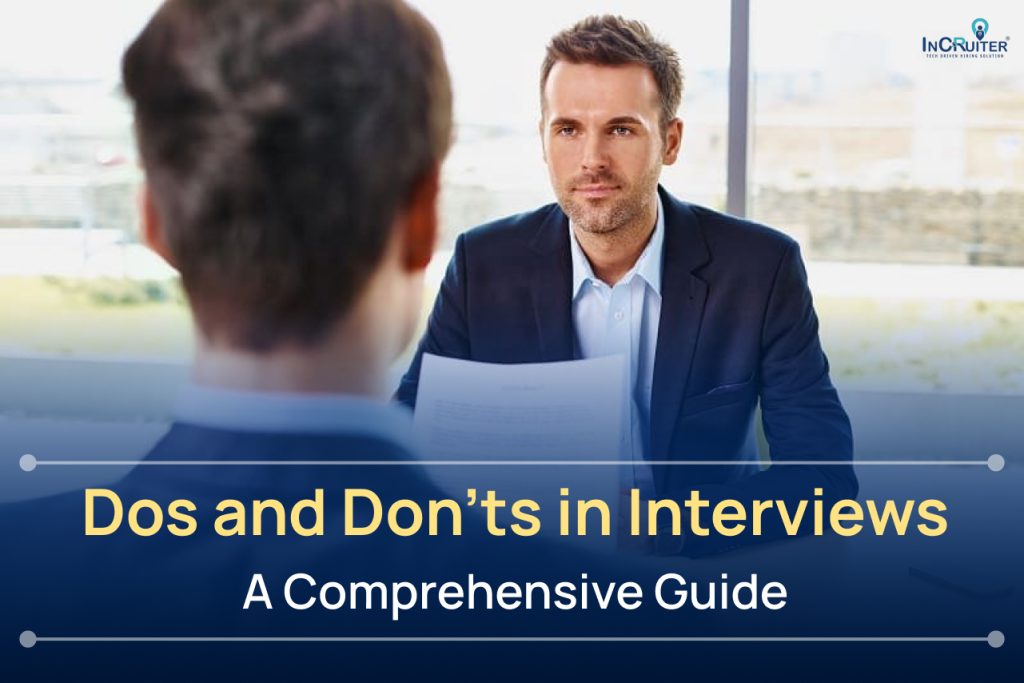
Interviews are scary until you prepare well. Statista sites report a candidate is twice as likely to get hired when proper research has been conducted on the company. If you make a good first impression, well, you have in your favor that 33% of recruiters say they make their hire/no-hire decision within the first 90 seconds of meeting you. It makes things much easier whether it is traditional in-person interviewing or virtual. Here’s a simple, in-depth guide to dos and don’ts in interviews to set candidates on the path to success.
Key Dos for Interview Success
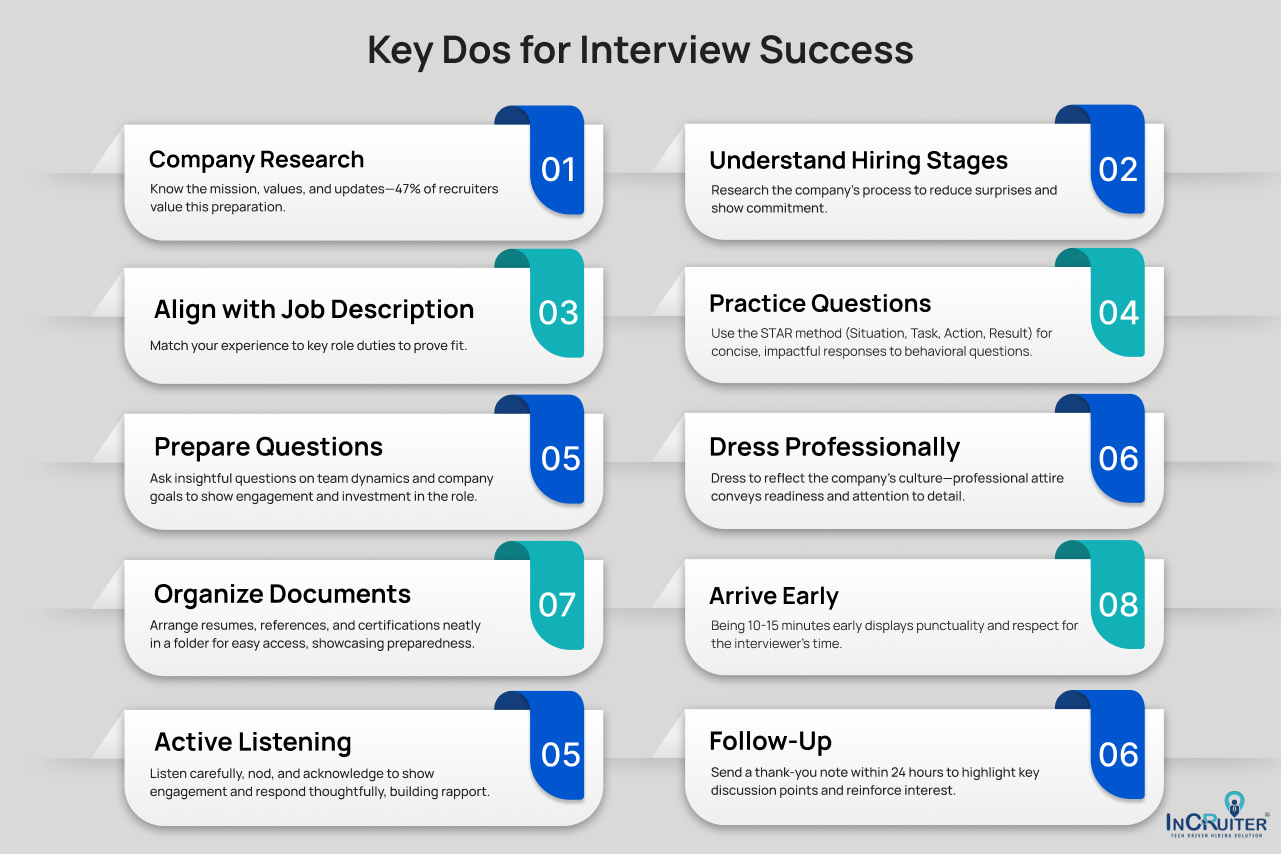
Conduct Thorough Company Research
Understanding the company is essential. One candidate, eager to land a job at a tech firm, skipped company research, resulting in awkward moments when asked about recent developments.
Make use of tools like Glassdoor, where insights and employee reviews about the company are readily available, or LinkedIn to connect with former employees. Knowing the company’s mission, values, and work culture helps you respond in ways that reflect alignment, a trait recruiters seek, as nearly 47% of interviewers say they would reject a candidate with little knowledge of the company.
Understand the Hiring Process
Every company’s hiring process has distinct stages—knowing them can greatly enhance your preparation. Most companies start with an initial screening, followed by technical rounds or a behavioral assessment. For example, tech roles might involve coding assessments, while managerial roles may focus on problem-solving and leadership scenarios.
Researching these hiring rounds signals your seriousness to the interviewer. Try platforms like LinkedIn to connect with company insiders or review hiring feedback on Glassdoor to gain insights. This proactive approach help you toreduce unexpected surprises and show that you’re a candidate who values preparedness, quality interviewers appreciate.
Review the Job Description Carefully
When reviewing the job description, focus on understanding the role’s core responsibilities and the skills required. This isn’t just about matching keywords; it’s about aligning your experiences with the job’s demands. One effective approach is to list out key responsibilities from the description and note examples from your background that fit each one.
That specific preparation helps you explain very confidently why you are good for the role. Research from Harvard further notes that as you tailor responses for relevance to the position details, your chances increase as high as 30%, as it shows genuine interest and readiness for the position.
Practice Common and Behavioral Interview Questions
Preparation is very important for behavioral questions; it gives you a really good experience to express your experiences properly. This may be structured by the STAR method i.e. Situation, Task, Action, Result—helps structure your responses with clarity. Start by describing the Situation or context of your experience, then outline the Task you were responsible for.
Next, explain the Action you took to address the task, and finally, detail the Result of your efforts. For example, if asked about a time you solved a problem, walk through each STAR step. Or you can practice through InCruiter mock interview platform specially design to help the candidates to make there interview journey smooth. Practicing with this platform ensures your answers are concise, relevant, and impactful.
Prepare Thoughtful Questions to Ask
Showing genuine interest by asking insightful questions leaves a lasting impression on your interviewer. Dive into topics like team culture, specific project responsibilities, and career growth opportunities. For instance, you can ask, “How does the team work on projects together?”—or “What long-term goals is the department working towards?”
These types of questions convey that you are not only interested in the job but also invested in the company’s vision and how you fit within it. According to studies, candidates who ask meaningful, role-related questions stand out, reflecting engagement and enthusiasm that interviewers appreciate.
Plan Your Attire
Dressing appropriately can make a significant impact, reflecting respect and readiness. Aim to align with the company’s culture by researching their typical dress code, often visible in employee photos or the company’s social media. For instance, formal attire can be fitted well in traditional fields, such as finance. On the contrary, the smart-casual approach may suit the technical firms better.
Research findings reveal that 71% of interviewers are likely to hire someone if that person dresses in business attire, which projects professionalism and pays attention to minute details. Even in virtual interviews, dress as if you were meeting in person it reflect professionalism and confidence of candidate.
Organize Necessary Documentation
Organize your documents for an interview by thinking of putting together a timeline of your accomplishments, starting with the most recent first. So put your latest degree or certificate at the very front of the pack, followed by previous academic qualifications and professional experiences in descending order.
This makes it easy for the interviewer to see your career progress at a glance. Keep it all in a neat folder, with the resumes on top and any work samples or references arranged just behind. It shows you’re polished, prepared, and know how to make a great impression!
Arrive Early
Arriving early ideally 10-15 minutes before your interview, that shows punctuality and thoughtfulness, setting a professional tone from the outset. Those few extra minutes let you settle any last-minute nerves, organize your materials, and adjust to the environment.
Employers appreciate candidates who are proactive, and research indicates that first impressions are often solidified within the first 90 seconds. Being early displays respect for the interviewer’s time and may even allow you to observe the workplace culture briefly, giving you insights that can help you connect more meaningfully during the conversation.
Engage in Active Listening
Active listening is essential in interviews. It not only shows respect but also ensures that you understand the question fully, helping you respond with clarity. Imagine this: an interviewer asks about a specific challenge, but you’re so focused on preparing your answer that you miss the question’s nuance.
By truly listening, you can respond thoughtfully, even pausing briefly to reflect before answering. Small cues nodding, maintaining eye contact, or a brief acknowledgment like “I understand” show engagement and help build rapport. Engaging actively in listening gives you a clear advantage, showing professionalism and genuine interest in the role.
Follow Up Post-Interview
After an interview, following up within 24 hours shows appreciation and reinforces your interest. Craft a personalized thank-you email to the interviewer, highlighting specific points discussed, like key responsibilities or unique company values. For instance, if teamwork was emphasized, mention how excited you are about contributing to a collaborative environment.
Keep it brief but thoughtful this note isn’t just polite; it helps you stand out. According to studies, candidates who follow up have a 10-15% higher chance of staying top of mind for recruiters, which could be the edge needed to secure an offer.
Also read: How Mock Interview Online Can Help You Ace Your Next Job Interview
Common Don’ts to Avoid in Interviews
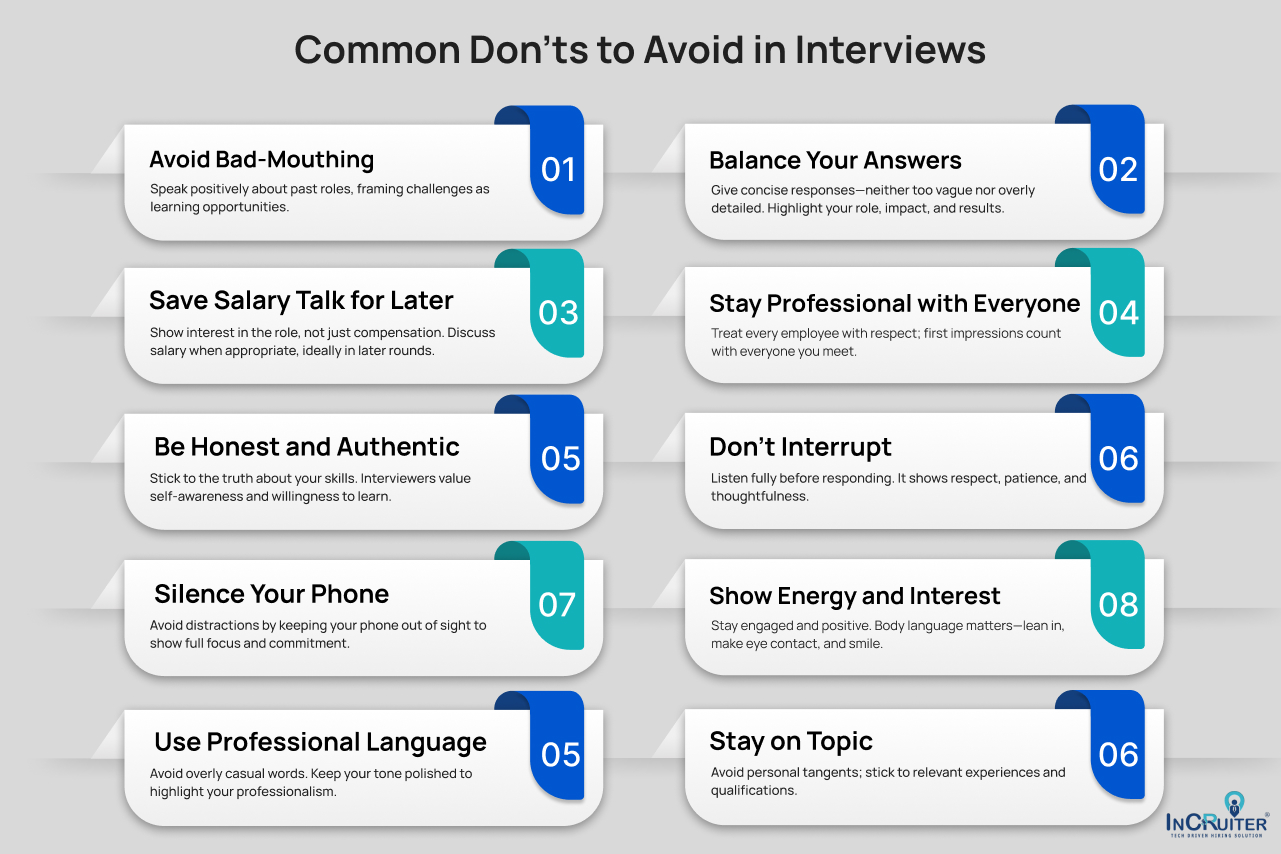
Avoid Negative Remarks About Past Employers
Talking down about previous employers is a slippery slope in an interview—it hints at bitterness and could make the interviewer think you’d do the same about them. Picture this, a candidate spends five minutes bashing their former boss, thinking it highlights their resilience.
Instead, the interviewer is probably wondering, “What if they say this about us someday?” Instead, frame any past challenges as learning experiences, spotlighting what you took away positively. It shows maturity and optimism, and let’s be real—that’s a vibe any company wants around.
Don’t Provide Vague or Overly Detailed Answers
Interview responses need balance; answer like you’re telling a gripping story, not rambling off a grocery list. Go too vague, and the interviewer might think you’re unprepared; go too detailed, and you risk boring them with unnecessary info.
Say you’re asked about a project you led, skip the tiny, technical details and focus on what matters: your role, the impact, and the results. This way, they get the picture without drowning in details. Think of it as crafting a movie trailer enough to excite, but not reveal the whole plot.
Steer Clear of Discussing Salary and Benefits Prematurely
Jumping into money talk too soon in the hiring process is like ordering dessert before dinner, it’s just too early. Interviewers want to see your excitement for the role itself, not just the paycheck. One candidate went straight into asking about salary, and the vibe immediately shifted from “enthusiastic applicant” to “just here for the bucks.”
When you focus first on the job’s challenges and opportunities, you paint yourself as someone driven by passion, not just compensation. Keep salary chats for later rounds unless the interviewer opens the door.
Maintain Professionalism in All Interactions
Professionalism in an interview setting goes beyond impressing just the hiring manager. Every single person you come across, from the receptionist up to the interviewer, affects the impression left. There’s a popular anecdote of a candidate who brushed off the receptionist, only to learn later that they held sway in the final hiring decision.
Treating all with respect and courtesy isn’t just being polite; it’s a smart move. You never know who is watching, and it’s always a good idea to make allies right from the start.
Be Honest and Authentic
Honesty isn’t just the best policy; in interviews, it’s a strategy that resonates. Overblowing your skills might seem like it’ll impress, but interviewers are experts at spotting fluff. Imagine a candidate claiming they’re a pro at a skill, only to fumble when questioned deeper—awkward, right?
So, if you still have a skill you are building, then just own it. Self-awareness and authenticity are appreciated more than the “fake it until you make it” attitude. When you are real about your skills, it makes people begin to trust you while setting you up as someone who wants to learn and grow.
Avoid Interrupting the Interviewer
Ever been in a conversation where someone keeps interrupting? Frustrating, isn’t it? In an interview, it’s even worse. Interviewers notice if you’re genuinely listening or just waiting to respond. Let them complete their thought; nod, make eye contact, and when they finish, take a moment to gather your answer.
Patience here doesn’t just reflect respect it shows you’re thoughtful and composed under pressure, qualities any team would value. So, relax, listen fully, and respond genuinely it’ll leave a lasting, positive impression.
Keep Your Mobile Phone Silent
Imagine your phone buzzing mid-interview—immediate focus killer. A quick glance or an accidental ring can throw off the whole conversation and make it seem like you’re elsewhere mentally. Silence it, or better yet, leave it out of sight.
Even if you’re expecting an important call, the respectful move is to prioritize the interview entirely. This undivided attention speaks volumes to an interviewer, reinforcing that you’re serious and not just filling a slot in your day. Small actions, like this, convey commitment without words.
Don’t Exhibit Disinterest or Fatigue
Apathy or low energy in an interview is like walking in with a “not really into it” sign over your head. It’s not just about answering questions but engaging in the conversation. Avoid slumping, crossing your arms, or blank expressions; instead, lean in, smile, and keep eye contact.
A candidate’s genuine interest shines through and can even compensate for skill gaps because interviewers see potential. Stay upbeat, ask questions, and show you’re excited, it’s a simple but powerful way to leave a positive mark.
Refrain from Using Informal Language
Interview language should not be mechanical, but surely not at the weekend hangout, either. Sounding too casual or being too informal by repeating terms such as “yeah,” “you know,” or “like” too much does not make a good impression.
Interviewers are looking for professionals, so aim to keep it polished yet friendly. Think of it this way: if you wouldn’t say it in a presentation to a client, skip it in the interview. Clear, professional language keeps the spotlight on your skills, not your word choice.
Avoid Over-Sharing Personal Information
While a touch of personality helps in interviews, too much personal detail can derail the flow. If the interviewer asks about your experience, stick to professional examples. Providing unrelated stories or personal details may shift the focus and make it challenging for the interviewer to assess your suitability for the role.
Keep the conversation tied to relevant skills and experiences; save the other stories for after you get the job! This way, you stay on topic and keep the interviewer engaged with your qualifications.
Also Read: Online Mock Interviews: A Guide to Master Job Interviews
Essential Tips for Virtual Interviews
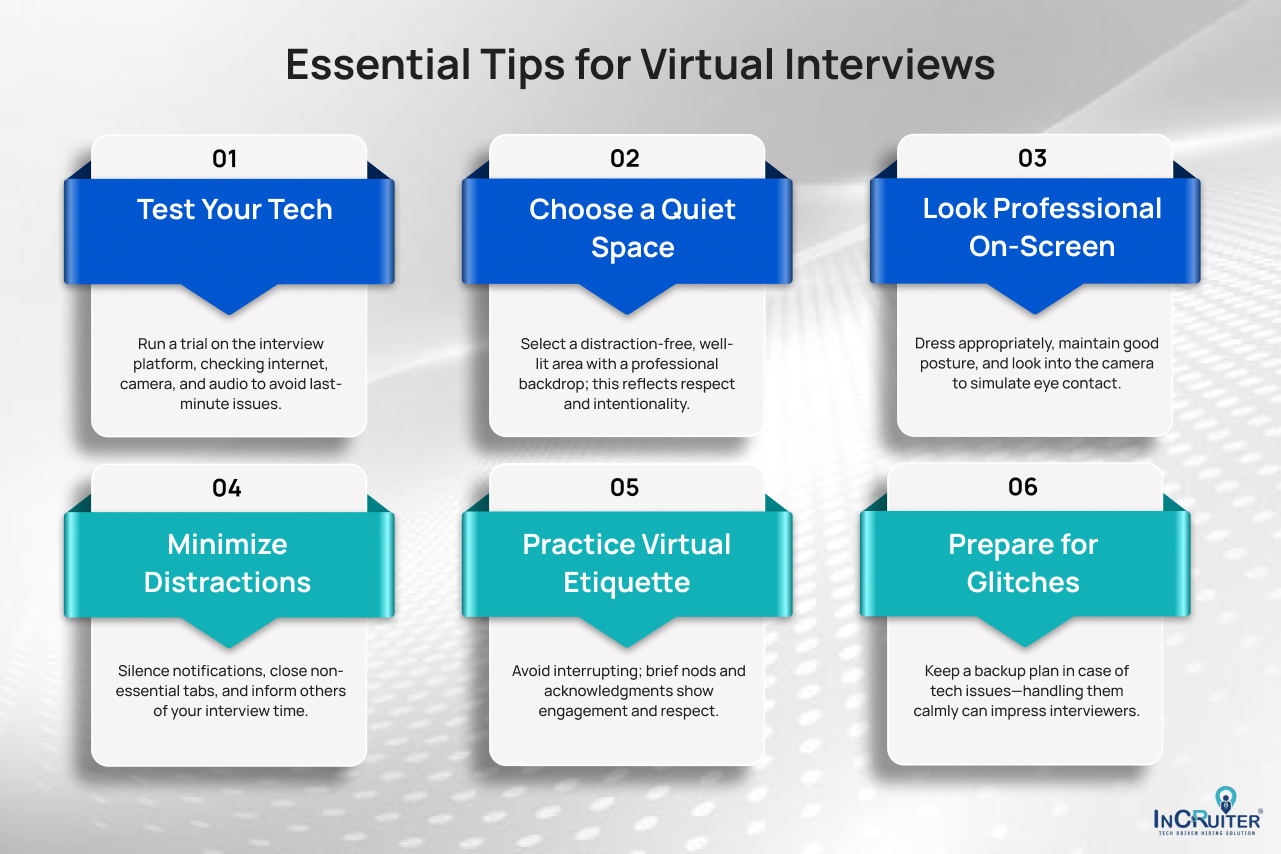
Test Your Technology in Advance
Ensuring a smooth virtual interview starts with testing your technology. This includes checking your internet, mic, and camera. Just in case you don’t want anything to go wrong at the last minute. Do a trial run using the same platform that you’re going to use; for example, you may do it using Zoom, Microsoft Teams, or Google Meet.
Testing can help you uncover potential problems and boost your confidence, knowing everything is ready. Forbes found that around 65% of interviewers reject candidates who have tech problems, emphasizing that preparation can make a crucial first impression.
Choose a Quiet, Professional Setting
Select an environment that states professionalism and minimal distraction while doing a virtual interview. Ensure the area chosen has minimal disturbances, very calm, and brightened; position your camera close to eye level to get the best, more real-looking presence.
This angle not only appears more polished but also allows better eye contact, which creates a connection with the interviewer. Research shows that employers form opinions within the first few minutes, so setting up a professional backdrop demonstrates intentionality and respect for the interview setting.
Maintain Professionalism On-Screen
Just as you would dress formally for an in-person meeting, maintain the same standard in a virtual interview. Choose attire that aligns with the company’s dress code, and sit with good posture. Eye contact is key here; aim to look into the camera, not the screen, to simulate real eye contact.
This small adjustment shows engagement and confidence. According to Albert Mehrabian’s 7-38-55 rule, communication is broken down into three components: 55% is conveyed through nonverbal cues, 38% comes from vocal elements such as tone and pitch, while only 7% is attributed to the actual words spoken. So these details matter more than you might think.
Minimize Distractions
Distractions can pull focus away from your responses. Before starting, silence notifications, mute your phone, and close any non-essential apps or browser tabs. Inform those around you of your interview schedule to prevent interruptions.
A candidate shared an experience where a loud notification disrupted their interview, detracting from their response. Small preparations like these allow you to focus fully on the interview, displaying your dedication and readiness.
Be Aware of Virtual Etiquette
In virtual interviews, pacing and response timing are important. Avoid interrupting by letting the interviewer finish speaking before you respond, as online platforms sometimes have delays.
A gentle nod or brief verbal acknowledgments, like “Yes” or “Absolutely,” can signal engagement without overtalking. A positive and respectful flow of conversation creates a stronger impression, showing you’re both attentive and considerate.
Prepare for Potential Technical Glitches
Even with perfect preparation, technical glitches can happen. Have a backup plan, like a phone number or secondary device, to reach the interviewer if your main platform fails.
If issues arise, stay calm, address them briefly, and then refocus on the interview. Handling these disruptions gracefully can actually highlight your problem-solving skills, which can make a positive impression on your interviewer.
Also Read: Tips for Navigating Video Interviews
Conclusion
Preparation, professionalism, and a spark of genuine enthusiasm, these are the cornerstones of interview success. From researching the company to understanding the importance of active listening, each tip equips you with tools to leave a lasting impression. Avoiding common pitfalls, like distractions or negative comments about past employers, underscores your readiness and character. So, take a moment to revisit these dos and don’ts before your next interview.
Remember, a well-prepared candidate stands out. Ready to sharpen your skills further? Explore InCruiter resources for practice and tools to elevate your interview game.
Ready to Transform Your Hiring Process?
Discover how our AI-powered interview platform can streamline your recruitment and find the best candidates faster.



